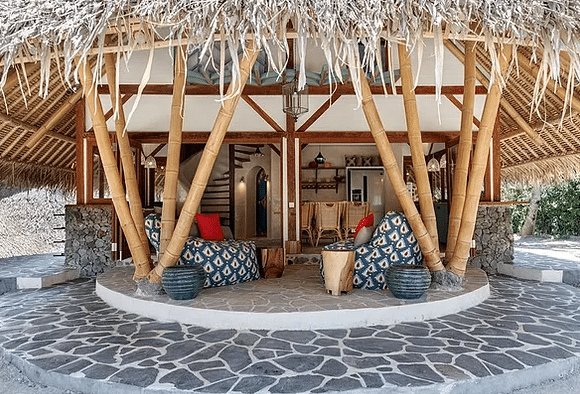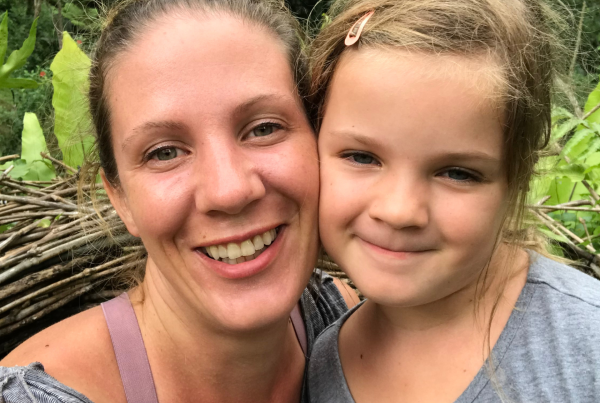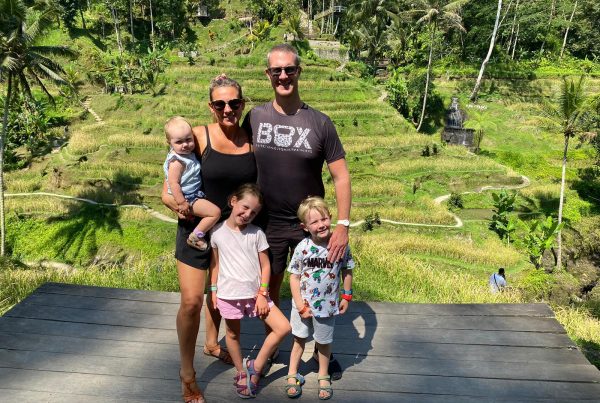Family: Cara, Greg, daughter Safia age 14, daughter Eloise age 9
Originally from: Melbourne, Australia
Arrived in Bali: 2015
Home in Bali: Ubud for 3 years, Pererenan 2 years
What made you move to Bali?
Greg and I travelled and lived overseas in our 20’s. Then we had children in our 30s, we found ourselves deep in the Melbourne suburban rat race, time starved, chasing our tails on the weekend and spending all year anticipating our next overseas holiday. We wanted to escape the grind and have a life that gave a sense of freedom and adventure all the time, not just once a year. I wanted the kids to experience other cultures and have the freedom to run wild & explore outdoors, like we did in our 1970’s childhoods. We were pursuing a natural, more organic, adventurous lifestyle and having been to Asia many times, we thought we could find it there. We investigated moving to several different SE Asian countries but then discovered the Green School in Bali and felt like it would be the perfect fit for the girls. We both loved Bali, the people, the artistic and spiritual culture and the evolving foodie scene. We also wanted to travel more around Indonesia, it’s so vast and culturally varied that it’s hard to logistically get a feel for it in one trip – but living in Bali we could easily explore many of the Indonesian Islands and other parts of Asia, during school breaks.
How long do you plan to stay?
We sold our family home in Melbourne and Greg wrapped up his construction company there, so we came with limited ties to anywhere and no real plan, or idea of how long we would stay. We are taking it one year at a time. Life here is pretty laid back and fabulous, if you are willing to go with the flow and not get frustrated by things not going to plan – It suits a certain personality type! We sometimes float the idea of moving to another country for another adventure but at this point we can’t think of anywhere we’d prefer to be more.
Where is home in Bali and why have you decided to live there?
We started our journey in Ubud, we fell in love with a unique antique teak villa there and bought it before we moved to Bali. It was in a village outside Ubud called Penestanan. It was the perfect landing for us, it’s a quiet, artistic village with a nice mix of friendly locals and expats – it’s close enough to Ubud to pop in for a yoga class, sound healing session or cacao ceremony but far enough to escape the throngs of tourists and live in peacefully in the rice fields.
Ubud was the place for us both to get creative and learn new techniques, I started exploring Indonesian textiles and traditional natural dying with a local artist and Greg started his journey with eco building using natural materials like earth, stone, bamboo and recycled timbers and traditional Indonesian construction methods. We were both fortunate to connect with local Indonesians who had a wealth of traditional knowledge in these areas and who were happy to share what they knew with us.
After three years in Ubud we decided to move to Pererenan near Canggu. We were ready for a different scene by then and many of our friends were based on the coast. Canggu has a completely different vibe from new-agey, creative Ubud – it’s surf focus and a bit more hip and edgy. So far I’m enjoying the different energy on the coast, the restaurant and bar scene is fabulous and I love being near the beach.
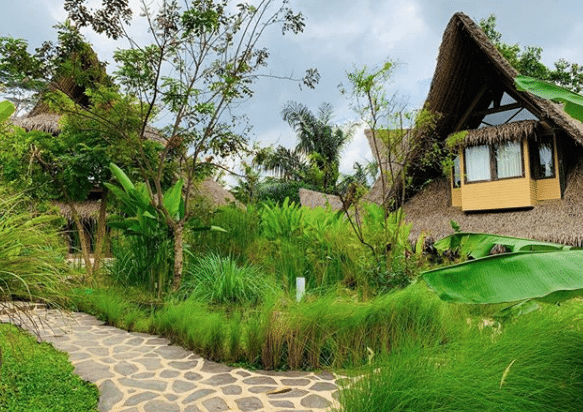
Was it difficult to find a villa?
We’ve never had any issues finding a villa. Like I mentioned above, we purchased our first home on a leasehold agreement of 30 years, we’ve since on-sold that. We found our villa in Pererenan through an agent without any dramas. I have heard stories of people being unable to find a villa that fits their needs for a reasonable price – but luckily we haven’t had that experience. Great villas are often handed down through the school community. Otherwise facebook pages and local real estate agents are the best way to find somewhere to live. Now that covid19 has hit, there’s a plethora of villas at really reasonable prices on the market.
What was a typical day for you prior to COVID19?
Every day is different here but generally I like to walk the beach & yoga, meditate, do some work, catch up with friends, take kids to sporting activities, maybe squeeze in a massage or spa treatment…eat out or cook. Not necessarily in that order.
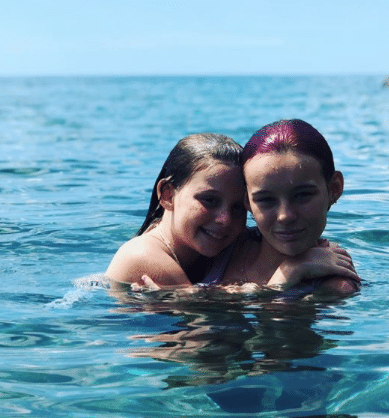
What keeps you busy and financially assists your life in Bali?
This has changed over the 5 years we have been here. To begin with I managed our two airbnb properties, the income from those provided enough for us to live here. We have since sold those and we are working together on some new construction projects here and in Australia.
Greg has been incredibly busy building two eco villages in Ubud and Sibang (which is next to the Green School). They are super stylish mud earth, stone & recycled timber houses set around a communal pool and entertaining area, 24 villas in total, on big plots of land, over looking flowing rivers, in jungle settings. They are 3 or 4 bedroom villas, mostly Green School family occupants, who are looking for a sense of community and an ecological way of living. It’s really great for families of young children who want their kids to be able to roam freely outdoors with neighbourhood friends. It also works really well for parents whose partners are absent through the week, commuting around Asia or working in Australia – because the community gives them and their children companionship and support.
Greg was lucky to meet a talented architect and designer when he first arrived here and they were both keen to jump on board with the eco village concept, they formed a company together called MUD. Since then his business has grown in size and he now has a team of architects and designers working for him. He has moved on to now building single mud earth homes (not in village settings) for us and clients.
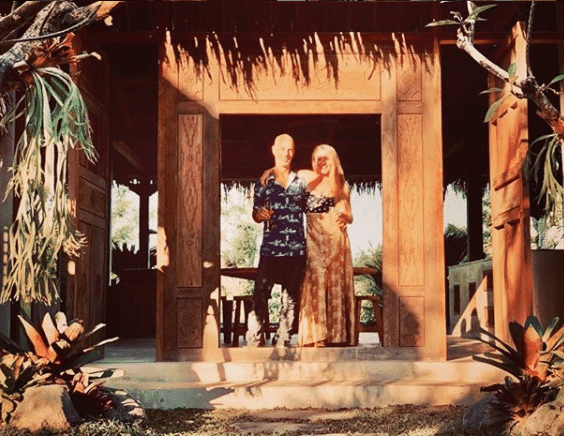
Your daughters go to the Green School. Can you share with us some of your favourite experiences in this unique learning environment!
The Green School blew us away as soon as we stepped onto campus to do a tour, from the incredible wall-less bamboo classrooms, Robinson Crusoe architecture in a jungle setting, to it’s strong focus on the natural world and ethos of sustainability, community & entrepreneurism.
The school is a community hub just as much for the parents, as it is for the children. There is always something happening on campus, from Bamboopalooza (similar to a school fete), to Rumble in Jungle (a dance party for the parents), Dance week, V-Day events, to just the regular Friday Farmer’s Market which the whole community attends after school assembly on Friday, to mingle by the bar, listen to live music and buy fresh local produce. It’s hard to pick a particular experiences but on the whole, the Green School has done exceptionally well at creating a fun community and experience for it’s student and parent body.
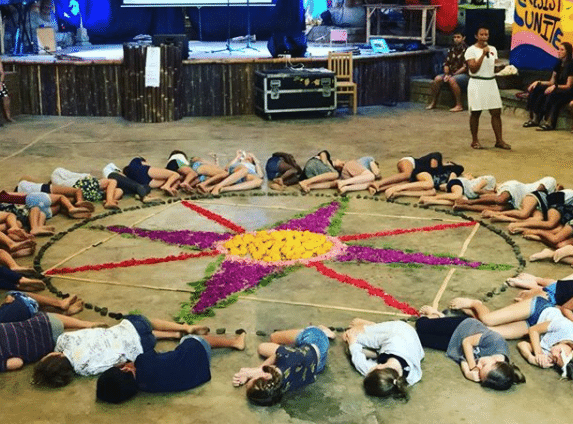
What visas are you on? How is it working for you?
We all have Kitas, which are residency visas that allow us to operate a company here and the kids are our dependents. We were able to get these golden tickets after Greg had set up his company but it wasn’t a cheap or easy process by any means! We initially hooked up with the wrong agent and spent thousands of dollars and 18 months of time on Kitas that were incorrectly setup and were worthless, so we had to start the process all over again with a more reputable agent. There are a thousand similar stories here about my only advice is that setting up a company in Bali and obtaining kitas is not a process for the faint hearted! Try and find legal advice and visa agents by recommendations and also you need super-sonic resilience!
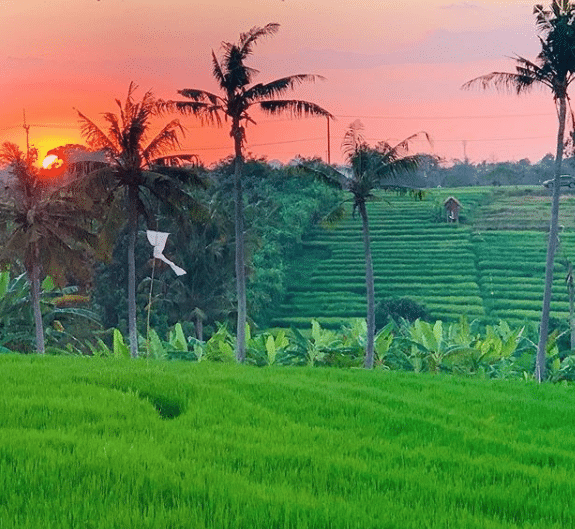
How is it being part of an expat community?
The expat community we found ourselves in became like family fast, it really was one of the best aspects of our move to Bali. We all connected through the Green School and our kids were all similar aged, so they’re like siblings now.
We all experienced landing in a foreign country and navigating our new lives together, so we really bonded and have relied upon each other for everything because none of us have any family support here.
We have had some unforgettable shared travel experiences together like jungle trekking to see Orangutans in Sumatra and Kalimantan, to staying with a Dayak Tribe in the thick Rain Forest in Kalimantan, to Himalayan hikes in Nepal and reunions in Japan. In a way, people who come here have similar mindsets and life situations, so it’s been awesome to meet equally adventurous people, who are easy going, spontaneous and happy to have an adventure somewhere at a moments notice.
On the flip-side to this, is that the Bali ex-pat community is transient, so you’re always losing people you’ve grown to love. This can be particularly hard for the kids to accept when they keep having to say goodbye to their best friends, but we try to remind them that they now have a large network of friends based all over the world.
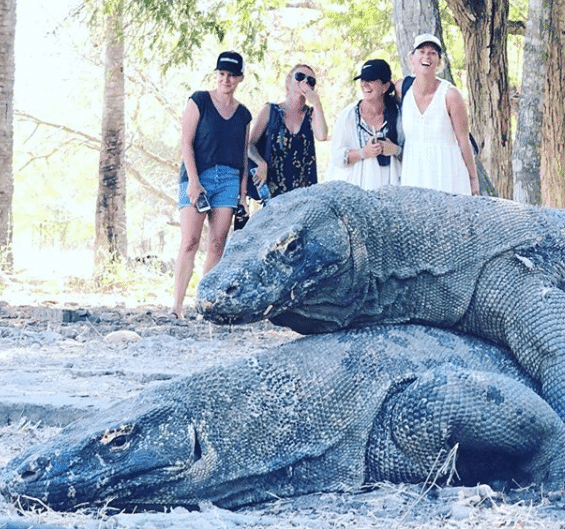
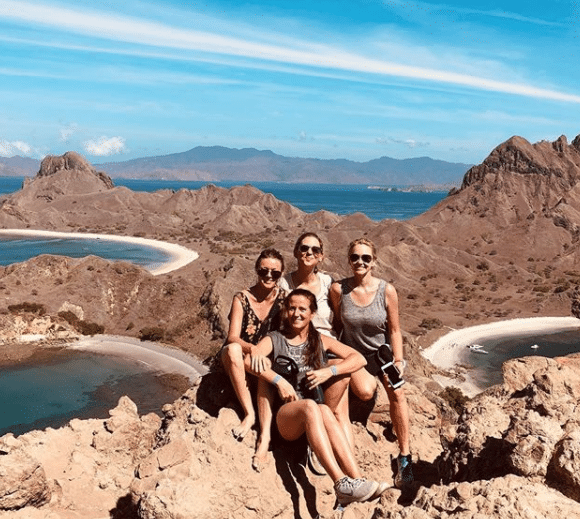
What do you still miss back home?
I miss good, reasonably priced wine and produce! Family and friends used to visit us regularly, so we got to see them more in Bali then we did back home, pre covid19.
Living in a foreign country during a pandemic can be extra stressful, how have all you managed living in Bali during COVID19?
I’m not really an anxious person, so I haven’t been overly stressed about Covid19. There was a period back in April when we and everyone we knew was deciding whether to leave Bali or stay-put. There was a lot of unknowns and uncertainty about what was going to occur with the virus around then. I was also getting pressure from family and friends back home to return to Australia, everybody thought Bali was not a great place to be during a pandemic due to the health care system. We ended up making the decision to stay, as Greg couldn’t leave due to his business and we didn’t want to be separated indefinitely. Im thankful that we didn’t go because I know of many families who have been separated, unable to reunite for going-on 5-6 months now.
It’s really been not too bad for us so far, I feel like I’m in a bit of a Bali-bubble, away from the 24 hours news cycle & severe lock-downs. Apart from the children being off school since May and having to home school them for a while, life hasn’t changed too much. A lot of amazing hotels and restaurants on the island are offering special Covid deals, so we have tried to take advantage of this and the quietness of the island by travelling to those usually crowded spots and eating at Bali’s best restaurants, so actually it’s been pretty nice actually.

How are the Balinese coping? Do you have any concerns for their welfare?
The Balinese are struggling financially at the moment, I’ve noticed that some locals are returning to farming and others are trying their hands at different small businesses – there has also been an increase in theft. Generally, Balinese society is well-equipped to weather hardships by relying and supporting each other through the tight knit extended family unit and the village Banjar, however there are still many people going hungry and the number is growing as time goes on. There has been some amazing charities that have sprung up, such as Crisis Kitchen, that are doing an incredible job feeding the hungry and are always looking for donations.
Thankfully, we are not seeing the Covid19 cases and death toll increase dramatically here like some places. The Covid19 task force seems to be doing a pretty good job of isolating cases, entire villages and doing contact trace testing. Most people here adopted wearing masks way back in March/April and have been doing so ever since. We’ve also had enforced sanitising and temperature checking at many places for months – and everyone coming in and out of Bali by air or sea must have a negative cover test result. The Balinese have really taken the situation seriously because they realise their economy is dependent on it.
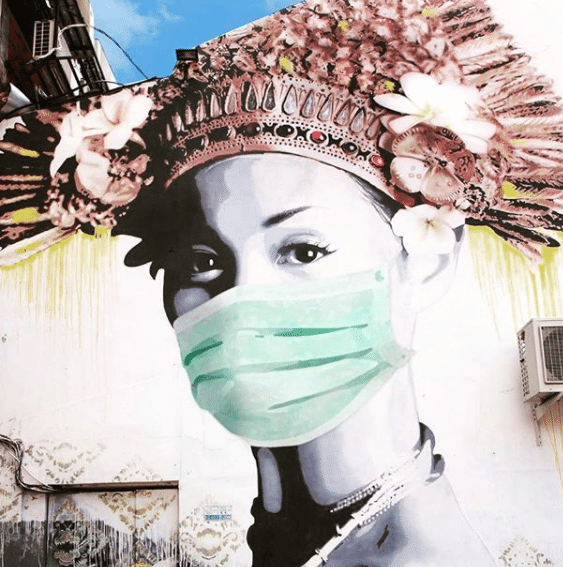
What do you think will happen to Bali when COVID19 settles down?
Many Balinese are hopeful that the island will be reopen to Tourists in September but this hasn’t been confirmed by Jakarta yet.
The Governor has said recently that Bali needs to stop depending solely on tourism and that he will begin strengthening other sectors of the economy, such as export. This could be a welcome side effect of Covid, as I think Bali needs to rethink putting all its eggs in one basket and start diversifying. While there are many positive impacts to tourism in Bali, the environmental impacts of mass tourism has taken its toll. Reefs are dying, the ocean and beaches are full of plastic, the clogged roads and pollution are awful. I’m hopeful that Bali might use this time to work towards achieving sustainable tourism.
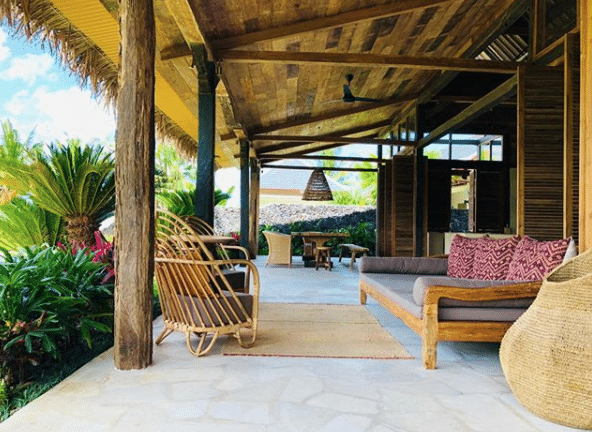
What is the vibe at the moment in Bali? It must be very strange to see such a busy tourist destination so quiet!
Bali shut down completely after Nyepi in March for a month or so, the roads were blissfully quiet and everyone stayed indoors. It felt like we were the only foreigners left on the island, then the beaches reopened and everyone started venturing outdoors again. Canggu is now bustling again because of the expats live there, most restaurants and bars have reopened, people are surfing, exercising, flying kites. However Ubud, Nusa Dua, Kuta, Seminyak and Legian which cater largely to holidayers, are like ghost towns still, they have been heavily affected by the shutdown. Travelling through these places feels really weird, sadly many shops and businesses are boarded up and empty and I wonder how many will be able to survive this. Bali, post pandemic, will be a very different place I think.
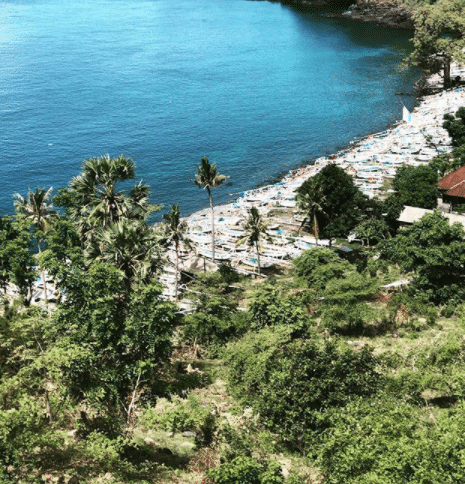
What advice do you have for other families making the move to Bali?
Life is short, do it – BUT let go of all expectations and learn to laugh at absurdities because nothing here ever goes to plan, or makes sense!
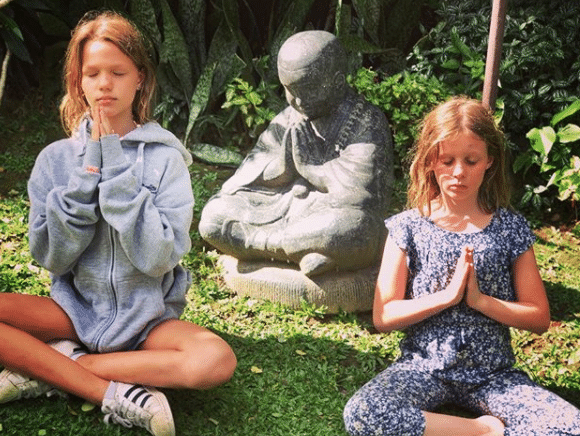
From time to time, MUD will be selling their beautiful large eco homes made from mud, stone & recycled timbers. For more information contact Mud Gamping.
For the most inspiring communal living visit: Eco Village Ubud – Desa Alam Indah
Want to live in the most amazing Ubud housing! Visit the available properties to rent.
